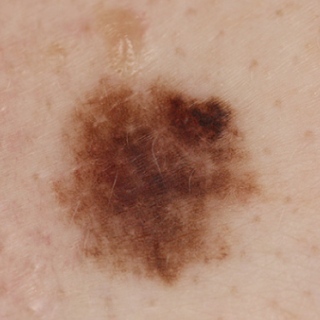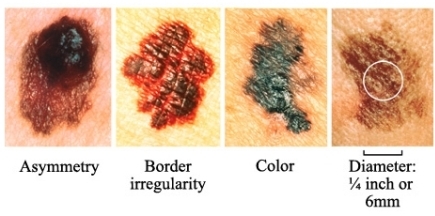
Identifying skin cancer early is critical because, when diagnosed and treated early, it is seldom fatal. When diagnosis and treatment are delayed, however, the risk of death increases significantly. For this reason, you should see your doctor at the first signs of skin cancer or if you notice any unusual growths or other issues with your skin. We’ll let you know more about what to watch for.
Keep in mind the fact that anyone can get skin cancer. Spending a lot of time in the sun without adequate sunscreen does increase your risk, but it is possible to develop skin cancer even if you always use sunscreen.
Identifying Skin Cancer
There are many different types of skin cancer, some more common than others. Different types of skin cancer have different symptoms, of course, but most share some common features. To learn more about the three most common types of skin cancer, follow the link.
To identify early signs of skin cancer, the American Cancer Society recommends using the ABCDE guide:
A stands for Asymmetry – one side of a mole or other blemish on the skin doesn’t match the other side
B stands for Border – the border is irregular, ragged-looking, or blurry
C stands for Color – the color isn’t consistent, but darker in some spots and lighter in others. Parts may be red, pink, blue, or black
D stands for Diameter – the diameter of a mole or other growth is greater than 6 mm or ¼ inch (about as big as a pea)
E stands for Evolving – the mole or growth is changing in color, shape, and/or size
These are not the only possible signs of skin cancer. Other things to watch for include:
- The development of redness or swelling around a mole
- Bleeding or oozing from a mole
- A mole with a scaly or scabby surface
- A sore that doesn’t heal for a long time
- A mole that itches or causes pain
- A mole that looks different than all your other moles
Note that skin cancer may look a lot like other things, such as a mole, a wart, a freckle, or even an ordinary pimple. It can be difficult to tell the difference, so make an appointment with your doctor if you’re not sure about something.
Here are more pictures of skin cancer. They say a picture is worth a thousand words, and seeing some pictures can give you a better idea of what to look for.

Keep in mind the fact that noticing some of the signs of skin cancer listed above does not always mean you have skin cancer. Most of the time, it doesn’t. There are other, less worrisome causes for most of these signs and symptoms. However, you should always consult a doctor at the first signs of skin cancer, just to be on the safe side.
How Doctors Identify Skin Cancer
If you find something suspicious or something that concerns you, you need to see your doctor. Identifying skin cancer is usually done by a minor surgical procedure called a biopsy. While your primary care physician, general practitioner, or internist can look at a questionable mole or lesion and advise you about what needs to be done next, those doctors probably don’t do biopsies. Instead, if they think you have signs or symptoms of skin cancer, they will refer you to a specialist like a dermatologist (a doctor that specializes in conditions of the skin), an oncologist (a doctor that specializes in cancer), or a general surgeon.
Often, a biopsy can be done in the doctor’s office. Even when performed in a hospital setting, it is usually an outpatient procedure. In many cases, you can be awake for the procedure. The area will be numbed so that you don’t feel any pain. A small sample of tissue is removed and examined under a microscope for cancer cells.
Please don’t put off a visit to a doctor because you’re afraid of identifying skin cancer. Often, biopsies come back negative, meaning no cancer cells are found. Even if you are diagnosed with skin cancer, though, it is a very treatable condition, especially when found early. Delaying a diagnosis won’t make the problem go away, but it might make matters much worse.
If You Find Out You Have Skin Cancer
If you are diagnosed with skin cancer, your doctor will discuss treatment options with you. If necessary, your doctor will refer you to a specialist that can better treat your condition.
Additional Reading:
Alternative Treatment – Information on alternative skin cancer treatments. Should you be considering alternative treatments?
